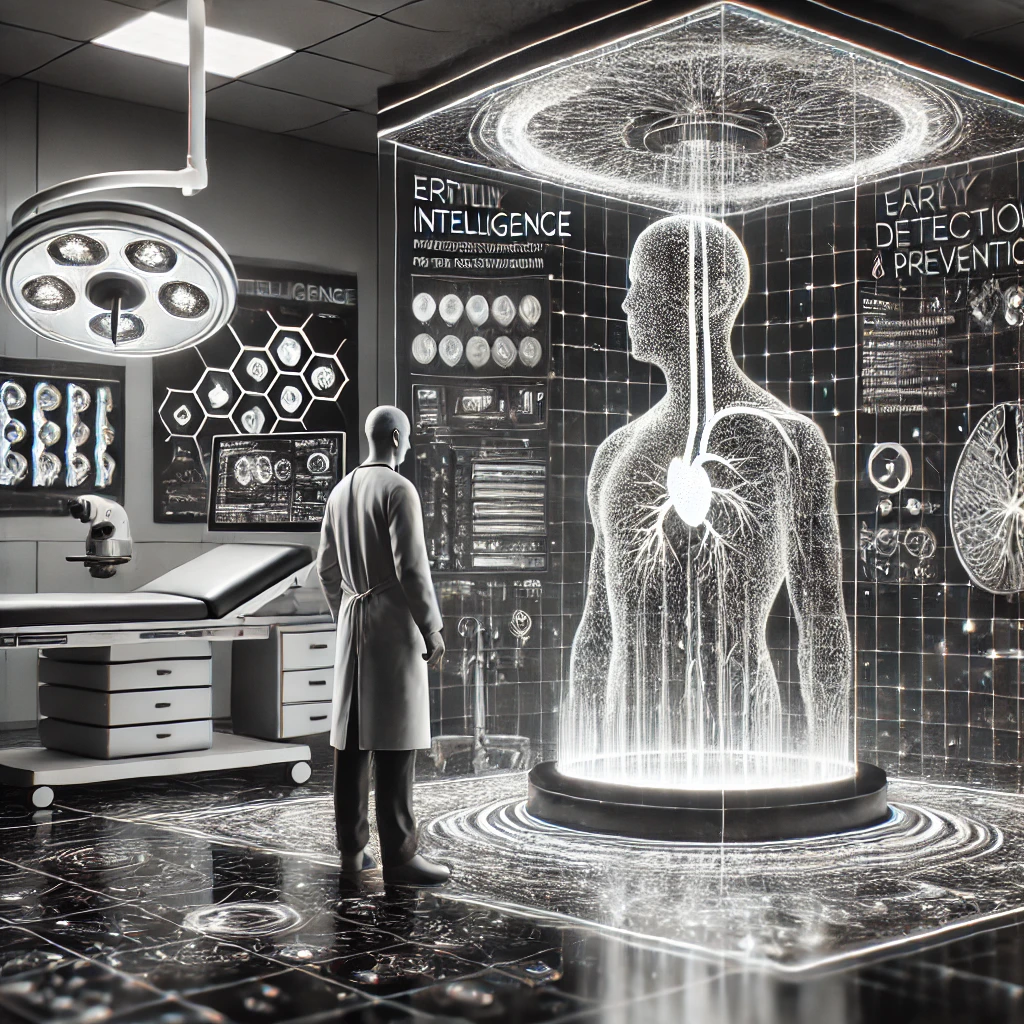
Health is a universal right, yet even today, many people do not have access to timely and effective treatment. Artificial intelligence (AI) stands as a revolutionary technology that can bridge this gap, contributing significantly to the achievement of the UN’sSustainable Development Goal 3 (SDG3) : ensuring health and well-being for all. In this context, prevention and early diagnosis play a crucial role, and AI is proving to be a key tool in addressing these challenges.
AI in Early Diagnosis: A New Paradigm in Healthcare
One of the most promising areas of AI is early diagnostics, which makes it possible to detect diseases in early stages, often before the first obvious symptoms appear. The use of AI in diagnostics is based on advanced deep learning and machine learning algorithms, which are capable of analysing large amounts of health data, such as medical images, medical records, biometric data and genetic information, with extraordinary precision.
A very relevant example concerns the application of these technologies to diagnostic practices for breast cancer, a disease that is still among the leading causes of female mortality worldwide. In fact, field studies have shown that AI-based systems can analyse mammograms with an accuracy that exceeds that of human specialists, and an algorithm developed by an international research team has reduced false negatives by 10%, thus improving the timeliness of diagnosis.
This achievement demonstrates how the integration of technology and clinical expertise can truly streamline diagnostic processes and optimise the deployment of medical personnel while saving lives.
At the same time, an interesting aspect that emerged from the study was the increased efficiency of safety protocols in the diagnostic process, in fact, an innovative element was the inclusion of an integrated safety system called ‘safety net’: when the AI identified a suspicious area in a mammogram classified as normal by the radiologist, the system would issue an alert to request a new review. This allowed 204 tumours to be discovered that would otherwise have been overlooked, demonstrating the importance of cross-checking between AI and human judgement.
But AI is not limited to cancer: in the field of cardiology, for example, highly sophisticated new algorithms analyse electrocardiograms and ultrasound images to detect signs of cardiovascular disease at an early stage. Similar systems are used to diagnose neurodegenerative diseases such as Alzheimer’s by analysing behavioural patterns and changes in language. Such applications not only improve the likelihood of effective treatment, but also reduce the costs of managing advanced diseases.
Personalised prevention: a silent revolution in patients’ lives
Artificial intelligence is also revolutionising the healthcare sector by introducing a more targeted and personalised approach to disease prevention. Indeed, through the analysis of healthcare big data, predictive algorithms are able to estimate the risk of developing certain diseases for each individual, or, intervene early in the early stages of the disease.
In Europe, several healthcare facilities are implementing these technologies to create tailor-made prevention programmes based on the analysis of patients’ genetic data, medical history and lifestyle, with the aim of counteracting the onset of serious diseases in the medium and long term.
A case in point are the conversational AI systems used to improve the process of treating type 2 diabetes. Based on blood tests combined with behavioural factors, these systems identify people at high risk and offer them personalised advice on diet and physical activity. And many projects on AI in medicine offer remarkable results: in some cases, the incidence of diabetes has been reduced by up to 30%, proving that early and targeted intervention can make a difference.
In a study published in Nature Communications, researchers demonstrated that the most common radiological examination, the anteroposterior chest X-ray, can be integrated with data from a patient’s medical record to diagnose type 2 diabetes mellitus at an early stage. To achieve this, an algorithm based on deep learning was developed and applied to chest X-ray images that, combined with certain clinical information from the patient, can diagnose the condition with good accuracy and in a timely manner with respect to the advanced and visible onset of symptoms.
In addition, AI contributes to faster identification of diagnoses and more personalised treatment by comparing patient data with those available in the scientific literature. This approach improves diagnostic accuracy and enables more timely and effective interventions.
These practices demonstrate how the integration of AI into everyday medical practice is already transforming the paradigm of prevention, making it more proactive and patient-centred. In addition, the combination of AI with other technologies, such as cloud computing and the Internet of Things (IoT), promises to create interconnected healthcare ecosystems that accompany patients in their daily lives. In the future, data collected from wearable devices, electronic health records and medical imaging systems will be integrated and interconnected to provide a holistic view of patients’ health status, enabling increasingly timely and effective interventions.
Challenges and Opportunities for the Future
Despite its potential, the adoption of AI in healthcare is not without its challenges. Among the main ones are ethical issues, mainly related to the management of sensitive data and the transparency of algorithms, as well as the risk of creating inequalities between those who have access to these technologies and those who are excluded. Furthermore, it is crucial to ensure that Artificial Intelligence is always used in healthcare protocols as a support to human decision-making, avoiding completely delegating the so-called critical responsibilities related to clinical diagnosis to automated systems alone.
However, looking to the future, AI promises to revolutionise global healthcare even further. The evolution towards increasingly integrated systems capable of combining data from different sources (from wearable devices to electronic health records) will lead to an increasingly preventive, predictive and personalised healthcare approach. This will not only contribute to the improvement of individual health, but will also have a positive impact on the sustainability of health systems, in line with what is called for by the goals of the 2030 Agenda: in particular in the combination of the economic sustainability of health systems and the increasing protection of human health.
Towards a More Equitable and Sustainable Health Care
Artificial intelligence represents one of the most powerful levers to address global health challenges. Through prevention and early diagnosis, this technology can improve the quality of life for millions of people, while reducing the costs and impact of disease on healthcare systems. However, for these promises to become reality, a collective effort is needed: investment in research, inclusive policies and an ethical framework to guide the development and use of AI in healthcare. All this hopefully through the adoption of shared policies and solutions not only at the national level but also with a view to common standards and practices shared at the international level. Only in this way will we be able to build a future in which health is never a privilege of the few, but a right guaranteed to all with the best means and the best and most innovative medical therapies.
















